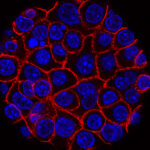Program News
News and stories about the UNC Lineberger Pancreatic Cancer Center of Excellence
-

Yeh, Johnson awarded five-year, $3.2 million research grant from NCI
The grant will support the first metastatic pancreatic cancer trial in the country to evaluate whether selecting treatment by tumor subtype will help patients match to more effective first-line therapies.
-

PROCLAIM Study open to accrual
The PROmoting CLinicAl TrIal EngageMent for Pancreatic Cancer App Study (PROCLAIM Study), which is focused on breaking down barriers to diverse clinical trial population recruitment, is enrolling patients.
-

Two pancreatic cancer clinical trials now recruiting at UNC Lineberger
We have recently been added as a study location for two phase I clinical trials currently recruiting patients with pancreatic ductal adenocarcinoma (PDAC).
-

Inspired research: A conversation with Kirsten Bryant, PhD
Kirsten Bryant, PhD, shares what motivates her in the lab, how mentorship and advocacy have fueled her passion for pancreatic cancer research, and why she’s encouraged by progress made in the past decade.
-

Pancreatic Cancer Action Network names Yeh to scientific and medical advisory board
Jen Yeh, MD, has been appointed to the Pancreatic Cancer Action Network’s scientific and medical advisory board, which is comprised of leading scientists, clinicians and healthcare professionals across the United States.
-

NCI awards Earp, Pylayeva-Gupta five-year, $2.69 million pancreatic cancer research grant
The NCI has awarded has awarded Shelley Earp, MD, and Yuliya Pylayeva-Gupta, PhD, a research project grant to investigate approaches to overcome barriers to pancreatic cancer immunotherapies.
-

Pylayeva-Gupta awarded Hettleman Prize
UNC named UNC Lineberger’s Yuliya Pylayeva-Gupta, PhD, one of four recipients of the Phillip and Ruth Hettleman Prize for Artistic and Scholarly Achievement.
-

UNC Lineberger pancreatic cancer therapy studies backed by 5-year, $10.9 million NIH SPORE grant
The National Cancer Institute has awarded the UNC Lineberger Pancreatic Cancer Center of Excellence a five-year, $10.9 million Pancreatic Cancer Specialized Program of Research Excellence (SPORE) grant.
